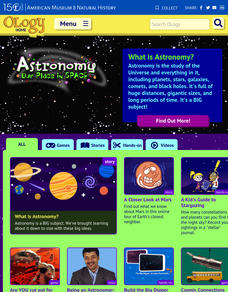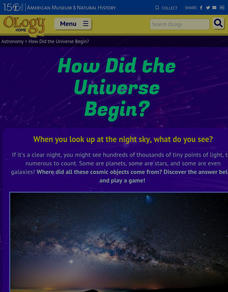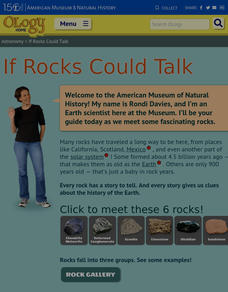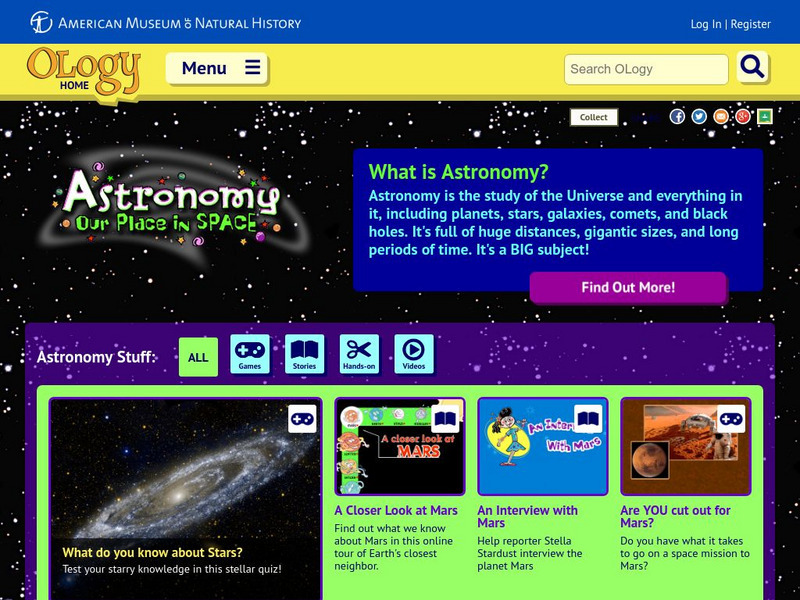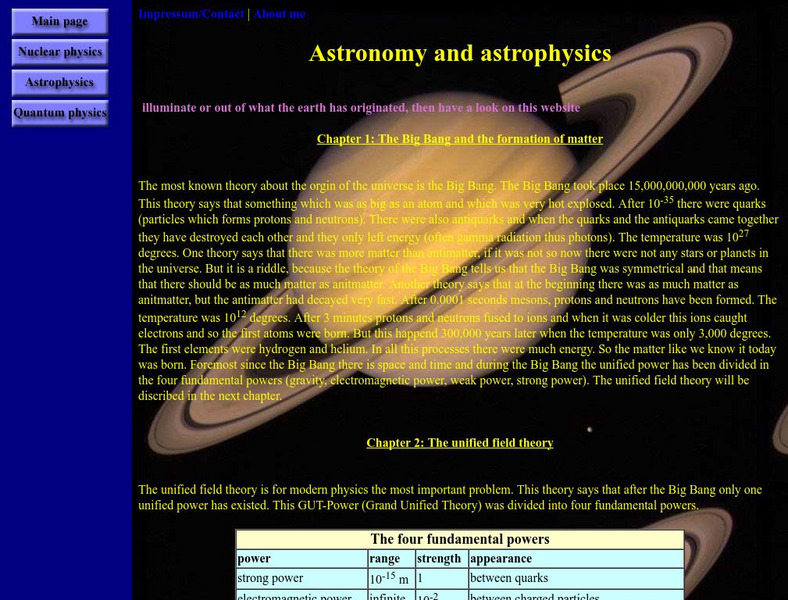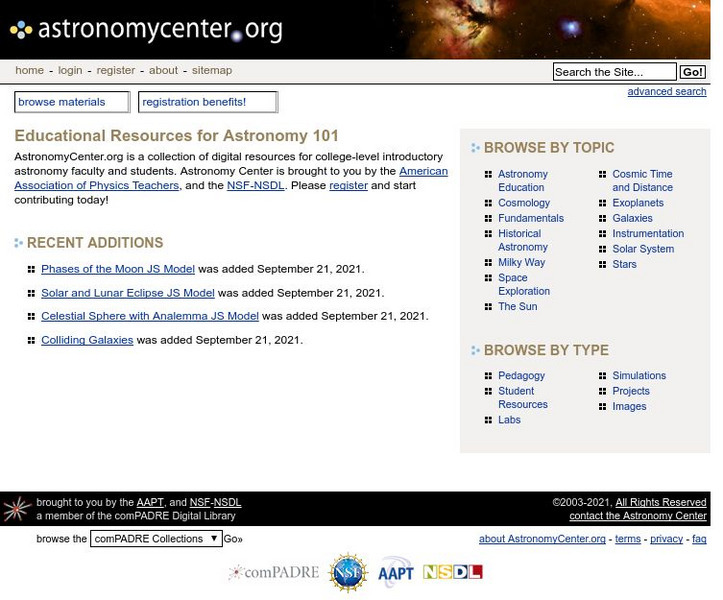American Museum of Natural History
What is Astronomy?
Go study the universe. Pupils learn seven aspects about astronomy and astronomers. They begin to learn about constellations; distance and motion between objects; gravity; the electromagnetic spectrum; dark matter and energy; and teams of...
American Museum of Natural History
Planetary Mysteries
A website all about planetary mysteries—it's a one-stop-shop for all things, stars, planets, and space travel. Scholars read an astronomy overview to discover the page's big ideas, then choose from the plethora of resources, including...
American Museum of Natural History
Being an Astronomer: Neil deGrasse Tyson
An interview delves deep into the life of famous astronomer Neil deGrasse Tyson.
American Museum of Natural History
One-on-One With The Sun
Follow along as Stella Stardust interviews the sun. A fun and informative interview provides scholars with information about the sun.
American Museum of Natural History
Journey to the Stars
Fifteen detailed pictures and informative captions delve deep into the exploration of stars—their life cycle and importance in the universe.
American Museum of Natural History
How Did the Universe Begin?
The Big Bang Theory is more than a television show. Pupils read how Edwin Hubble observed other galaxies and noticed that the galaxies are moving away from each other. Scholars learn about the idea of the big bang and what happened next...
American Museum of Natural History
Beyond Planet Earth
Scholars take a journey through space with 16 eye-catching images. Along the way, learners read captions starting with the moon, then move onto asteroids, Mars, and Jupiter.
American Museum of Natural History
If Rocks Could Talk
Meet some interesting rocks. Learners discover information about the three types of rocks and different rocks that are within each group. They read imaginary interviews with six rocks as each rock tells the story of their formation and a...
American Museum of Natural History
Meet the Universe's Main Attraction ... Gravity
Learners read a short description about gravity and what it does and then explore the two ideas about how gravity works. After gaining a better understanding of the concept, individuals participate in a thorough experiment on what would...
American Museum of Natural History
The Milky Way Galaxy
Just how big is the galaxy? Learners read information about the size of the Milky Way galaxy to better comprehend its size. Pupils develop an understanding of the number of stars in the galaxy by finding just how big a billion is and...
American Museum of Natural History
A Closer Look at Mars
A website looks at how we know so much about Mars—telescopes, robots, and spacecraft—and the search for martian life. Following the informational text are three questions that quiz pupils about possible life on Mars.
Weber State University
The Sun and the Seasons
Why is there more daylight in June than in December if you live above the equator? How does the angle of sunlight shift throughout the year? Answer these questions and more with an interactive article about the sun, its path through the...
American Museum of Natural History
American Museum of Natural History: O Logy: Astronomy: Our Place in Space
This resource is a place for learning all about astronomy--stargazing, planets, space science, and interesting astronomical phenomena and discoveries. Explore, ask questions, find information, and meet American Museum of Natural History...
Other
National Optical Astronomy Observatory Homepage
The National Optical Astronomy Observatory runs most of the big professional optical telescopes in the United States and this is their homepage. It includes information about the many facilities they run, some of the recent science...
Other
Astronomy and Astrophysics
This site is about Astronomy and Astrophysics. The site has plenty of information and links to related topics.
NASA
Nasa Space Science Data Archive: Astronomy and Astrophysics
NASA sponsored site dealing with several topics in Astronomy and Astrophysics. The site provides links to various topics.
University of Arizona
University of Arizona: Department of Astronomy and Steward Observatory
The University of Arizona operates Steward Observatory research website and the Department of Astronomy academic website.
American Association of Physics Teachers
Com Padre Digital Library: The Astronomy Center
A searchable collection of "curriculum materials, images, classroom demonstration, learning resources, evaluation instrumnets, and articles about approaches to astronomy education". Users can contribute materials by creating a free account.
Other
The Astronomy Cafe
NASA scientist Sten Odenwald calls this his "web site for the astronomically disadvantaged." Do you have lots of questions about space that you can't seem to get answers to? Would you like to learn about a career in astronomy, Big Bang...
Other
Sky Server: About Astronomy
This site from SkyServer provides the history of astronomy as well as links to mapping the sky, galaxies, cosmic structures and much more. Several pictures are given, and the article is medium in length.
NASA
Nasa: Imagine the Universe: The History of Gamma Ray Astronomy
This NASA article discusses the history of gamma-ray astronomy. Related resources.
British Library
British Library: International Dunhuang Project: Chinese Astronomy Resource
Using the early Dunhuang Star Atlas, an important historical and scientific document of the sky seen from China dating from before AD 700, learn about astronomical history from the perspective of China. Find resources and analysis that...
Other
What Is Radio Astronomy?: Radio Astronomy at Vla and Vlba
Describes two radio telescopes run by the National Radio Astronomy Observatory (NRAO). The first telescope is called the Very Large Array (VLA) and the second is called the Very Long Baseline Array (VLBA). Both use radio interferometry....
National Science Foundation
National Science Foundation: Astronomy and Space: Research Overview
Explore some of our most fundamental questions about space exploration with this research overview collected by scientists at the National Science Foundation. Additionally, experience deep space first-hand with telescope interactives.
Other popular searches
- Astronomy and Space Science
- Astronomy Vocabulary
- Planets and Astronomy
- Astronomy Activity
- Science Astronomy
- Ancient Astronomy
- Astronomy Lesson Plans
- History of Astronomy
- Space Science Astronomy
- Space and Astronomy
- Astronomy Navigation
- Astronomy History

